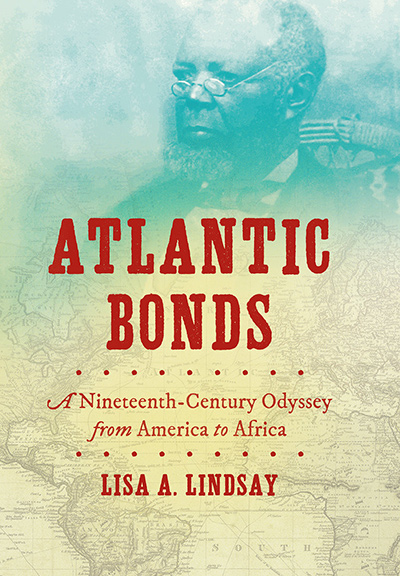 Professor Lisa Lindsay’s new book, Atlantic Bonds: A Nineteenth-Century Odyssey from America to Africa (University of North Carolina Press, 2017), tells the fascinating story of James Churchwill “Church” Vaughn, a Black man born in South Carolina who left the United States for Africa a decade before the American Civil War to fulfill his father’s dying wish. Although Vaughn first settled in Liberia, he soon moved to Nigeria, where he lived until his death in 1893.
Professor Lisa Lindsay’s new book, Atlantic Bonds: A Nineteenth-Century Odyssey from America to Africa (University of North Carolina Press, 2017), tells the fascinating story of James Churchwill “Church” Vaughn, a Black man born in South Carolina who left the United States for Africa a decade before the American Civil War to fulfill his father’s dying wish. Although Vaughn first settled in Liberia, he soon moved to Nigeria, where he lived until his death in 1893.
“This is the rare back-to-Africa success story,” Lindsay explained. “Vaughn didn’t come as part of a big colonizing mission, he didn’t come with guns blazing, and he also didn’t come expecting to be received into the motherland with open arms. He went, I think, with a very realistic notion: it’s going to be tough, but I’m going to do what I can to make a living and make connections, and stay alive.”
Lindsay describes Atlantic Bonds as a “contextualized biography” of Church Vaughn. This means that Lindsay connects Vaughn’s story to the major historical trends that shaped Nigerian, American, and Atlantic world history. Vaughn was involved in the wars that fed the slave trade, worked for missionaries, and experienced the early years of British colonization. He later led an anti-racist revolt against some missionaries and founded a prosperous business. His descendants were among the first generation of anti-colonial nationalists in Nigeria.
All the while, Vaughn and his descendants exchanged letters with their relatives in the United States. This allows Lindsay to present a multi-dimensional Atlantic world story. “The fact that they had these parallel family trees, and that they kept in touch, enabled me to tell a story that compared his life and times in Africa with his relatives in the United States,” Lindsay said. “One of the surprising things that comes out of this is that life was much better for Vaughn than for his relatives in South Carolina before and after the Civil War, and really until the 1920s and 30s.”
Taking an Atlantic world approach led Lindsay, who was trained as a colonial Africanist, into unfamiliar scholarship, including histories of South Carolina and of the great migration. Her background as an Africanist, however, gave her a unique perspective on this scholarship. “Coming from another field, I think U.S. history looks different than if you come at it from inside U.S. history,” Lindsay explained.
Through Vaughn’s story, Lindsay makes important claims about slavery and freedom. First, she demonstrates the ubiquity of slavery in the Atlantic world, as Church Vaughn moved from one slave society to another. Even in Liberia, African Americans who left the slave society of the United States replicated the institutions they had fled.
Lindsay also shows that slavery and freedom existed on a spectrum. “There were lots of shades of unfreedom, or shades of labor exploitation and dependency, in between, and just because someone wasn’t legally a slave didn’t mean that they weren’t subject to those things. And Church Vaughn, in fact, was never a slave or never a slaveholder himself, but he was involved in lots of points along the spectrum,” Lindsay said.
In many ways, Atlantic Bonds was an ideal second book for Lindsay, who has long been interested in the connections between Africa, the United States, and the rest of the world. “I first got interested in Africa when I was a college student in the late 1980s building shanties against apartheid on my university campus and listening to African pop music that was becoming available in the United States at that time. And so between political activism and being interested in music, I got interested in Africa. But I got interested in Africa via its entanglements with the rest of the world.”
–Aubrey Lauersdorf
